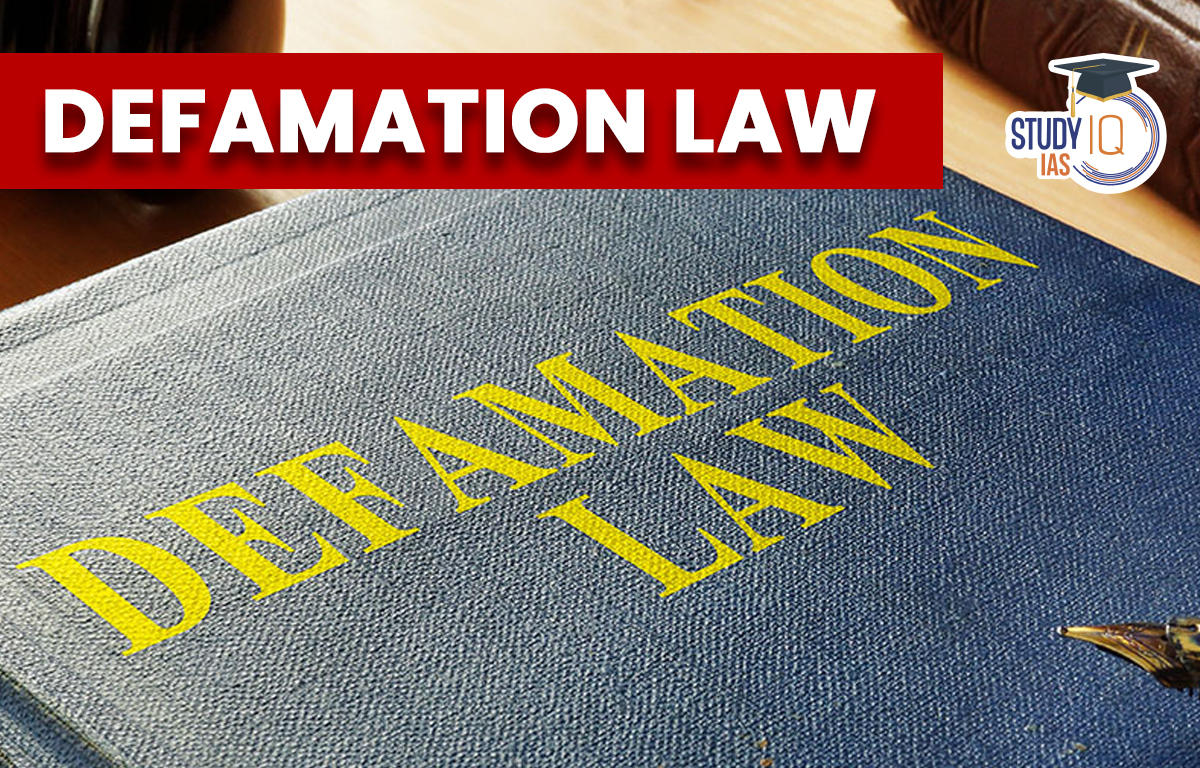Table of Contents
Context: An Opposition Party MP was recently sentenced to two years of prison over a defamation case.
What is Defamation?
- Defamation: Defamation is the act of communicating false statements about a person that injure the reputation of that person when observed through the eyes of ordinary man.
- Defamation in India: In India, defamation can both be a civil wrong and a criminal offence.
- In Indian laws, criminal defamation has been specifically defined as an offence under the Indian Penal Code (IPC) whereas the civil defamation is based on tort law.
- In a criminal case, defamation has to be established beyond reasonable doubt but in a civil defamation suit, damages can be awarded based on probabilities.
- Criminal Defamation: Section 499 of the Indian Penal Code (IPC) states defamation could be through words – spoken or intended to be read, through signs, and also through visible representations. These can either be published or spoken about a person.
- Section 500 of IPC stipulates an imprisonment of up to two years, with or without fine for criminal defamation.
- Civil Defamation: Defamation can take two forms libel (by writings) and slander (by spoken words).
- A civil suit can be filed before a district court or a high court, depending on the quantum of damages being sought by the complainant.
- Tort law is an area of law which does not rely on statutes to define wrongs but takes from ever-increasing body of case laws to define what would constitute a wrong.
Free Speech v/s Defamation Laws
- Defamation laws act as a counter to the fundamental right to freedom of speech (Article 19(1)(a) guaranteed by the Indian constitution.
- Defamation is one of the eight grounds listed as reasonable restrictions on right to free speech under Article 19(2) of the Constitution.
- The fundamental right to freedom of speech and expression cannot be misused to tarnish the reputation of another individual.
- In order to sustain and protect the reputation of an individual, the State has kept the provision under IPC section 499 alive as a part of law.
Important Supreme Court Judgments
- Subramanian Swamy v Union of India Case (2016): The Supreme Court held that the right to “reputation” was protected under Article 21 of the Constitution which guarantees “life and personal liberty”.
- The SC also held that criminal defamation law protected the feeling of fraternity or solidarity between members of a society.
- Ram Jethmalani Vs. Subramanian Swamy (2006): The High Court of Delhi held Dr. Swamy guilty for defaming Ram Jethmalani in the Rajiv Gandhi assassination case.
- Shreya Singhal Vs. Union of India (2015): It is a landmark judgment regarding internet defamation. It held Section 66A of the Information Technology Act, 2000 unconstitutional, which punishes for sending offensive messages through communication services.
Decriminalizing Defamation
- Criminal defamation law has been abused by corporates filing ‘Strategic Lawsuits Against Public Participation’ (SLAPP) suits across the globe.
- India: In India even the political class has been using decriminalization law in form of baseless and false allegations.
- The law has also been misused against the media on a large scale to silence legitimate criticism.
- Law Commission in 2014 noted that threats of legal action with punitive damages under the laws of defamation put undue pressure on journalists and publishing houses.
- Any change to the laws on defamation in India must balance these two considerations.
- The law has also been misused against the media on a large scale to silence legitimate criticism.
- Global status: Many countries such as the UK, Sri Lanka, El Salvador and Jamaica have decriminalized defamation.
- In 2022, Maldives Parliament passed a Bill to repeal a draconian law that had re-criminalised defamation in the South Asian nation.
Way Forward
- Defamation laws have been enacted to prevent person from maliciously using their right to freedom of speech and expression.
- But given its widespread misuse, India needs to move towards decriminalizing defamation and treat it as a civil wrong for which law already provides for damages.
- Decriminalising it will bring the IPC in accord with Article 19(2), ensuring that the means used to discourage defamation do not end up damping legitimate criticism.


 Serious Fraud Investigation Office (SFIO...
Serious Fraud Investigation Office (SFIO...
 Article 142 of Indian Constitution, Sign...
Article 142 of Indian Constitution, Sign...
 Pakistan-Occupied Kashmir (PoK): History...
Pakistan-Occupied Kashmir (PoK): History...





















